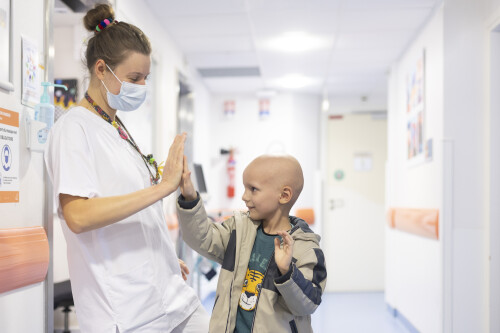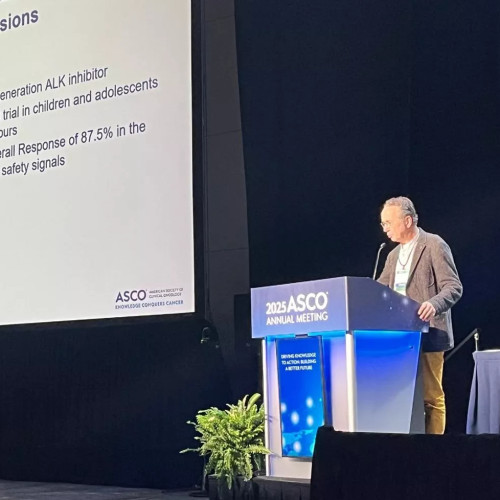SKYLINE
By unleashing certain capacities of the immune system, immunotherapy is a proven treatment for metastatic disease, but many patients still do not derive lasting benefit from it. Cancer uses many different mechanisms to evade treatment.
To reinforce the action of this immunotherapy, clinical researchers at Curie are proposing to combine two immunotherapies targeting 2 different but complementary mechanisms, PD-L1 and TIGIT, with atezolizumab and tiragolumab, in addition to chemotherapy. The first trial of its kind, Skyline is a Phase I/II trial that will evaluate the toxicity and anti-tumor activity of the combination of the two immunotherapies. Trial opening imminent.
CUPCAKE
Institut Curie is one of the world leaders in the detection and analysis of circulating tumor DNA in patients' blood, a method that has proven its effectiveness in anticipating relapse and optimizing treatment. A vast multi-center study, called CUPCAKE, coordinated by Institut Curie, will evaluate the value of liquid biopsy in predicting relapse in triple-negative breast cancer in a large cohort. The aim is to be able to rapidly propose a therapeutic alternative, when relapse is limited both in size and number of metastases.
This study will evaluate the efficacy of combined monitoring of circulating DNA in the blood, measured every three months, and whole-body mapping of tumor involvement with a nuclear medicine approach - PET/CT using FAPI, a new tracer with better performance than conventional PET/CT for triple-negative cancers. Opening soon.
|
Among the 60,000 new cases of breast cancer diagnosed each year in France, triple-negative breast cancer affects around 15% of patients, representing 9,000 new cases detected each year. The biggest challenges in triple-negative breast cancer are:
Source INCa 2023 |
TOPOLOGY
Many triple-negative breast cancers are characterized by defects in the DNA repair mechanisms at work during cell division. Agents that target these "defects" are therefore of particular interest. The TOPOLOGY study will investigate the activity of one such treatment, the new agent PLX038, and ensure its safety and mechanism of action.
This is a chemotherapy (SN38), already effective in these cancers, coupled with a kind of "vehicle" (PEG) that will enable the treatment to be delivered in a more concentrated form to the tissues and the tumor, while offering a longer release time. These two properties should make the molecule more effective, while guaranteeing controlled toxicity.
This is a Phase II study which, if successful, will lead to the launch of a larger-scale trial to compare this innovative agent with the reference treatment. The study has been open since the end of February 2024.
The principal investigator for these 3 clinical trials is Prof. François-Clément Bidard, medical oncologist at Institut Curie and professor at the Université de Versailles Saint-Quentin-en-Yvelines / Paris-Saclay.
Ambitious research programs at Institut Curie
Defined as a research priority in France by the "Cancer Plan 2021-2030", triple-negative breast cancer is the focus of much work at Institut Curie. Researchers are advancing on all fronts, to better understand this pathology, identify therapeutic targets, propose biomarkers predictive of response to treatment and combat metastases.
The Institut Curie has launched a fundamental and clinical research program called CASSiOPEIA, led by Dr. Fatima Mechta-Grigoriou[2] and Prof. François-Clément Bidard. This Hospital-University Health Research (RHU) program is co-financed by the French National Research Agency, Institut Curie and industrial partners. The project aims to gain a better understanding of triple-negative breast cancers, and in particular their heterogeneity, in order to identify at diagnosis those patients who could develop resistance to treatment. The teams will evaluate new methods for detecting metastases and early recurrence. The ambition is to develop novel therapies targeting fibroblasts, a very abundant cell type in tumors, not yet targeted therapeutically. This innovative program is already behind the Skyline and Cupcake trials.
Dr Céline Vallot[3] is dedicated to personalizing treatments by scrutinizing the epigenetic identity cards of tumor cells. Using the "Single Cell" method, she identifies at an early stage the profiles responsible for the transformation of healthy cells into cancer cells. These discoveries could support the development of new diagnostic tools and the identification of innovative therapeutic targets.
Dr Philippe Chavrier[4]'s project focuses on the components of the environment in which metastatic cells develop, revealing the biological parameters that define an unfavorable prognosis. His recent work has highlighted the novel role of a signaling pathway, offering promising prospects for new therapeutic possibilities. He was also awarded the Grand Prix Ruban Rose 2022 for his innovative project on the development of invasive tumor cell behavior in breast cancer.
The work of Dr Albertas Navickas[5], winner of the 2023 Rose Avenir ribbon award, helps to explain the mechanisms that lead breast cancer cells to migrate and develop lung metastases.
[1] With over 7,000 women undergoing treatment and more than 3,000 new cases of breast cancer treated every year, the Institut Curie is Europe's leading breast cancer treatment center.
[2] Outstanding Research Director at Inserm, Head of the Stress and Cancer team at the Cancer, Heterogeneity, Instability and Plasticity (CHIP) unit - U830 Inserm
[3] Directrice de recherche au CNRS, cheffe de l’équipe Dynamique de la plasticité épigénétique dans le cancer au sein de l’unité Dynamique de l'information génétique : bases fondamentales et cancer (UMR3244 / CNRS / Sorbonne Université) et du département de recherche translationnelle
[4] CNRS Research Director, head of the Membrane and Cytoskeleton Dynamics research team at the Cell Biology and Cancer unit (UMR144 / CNRS / Sorbonne University).
[5] Inserm Research Fellow, RNA, tumor microenvironment and metastasis team within the Genome Integrity, RNA and Cancer Unit (CNRS UMR3348 / Université Paris-Saclay)



